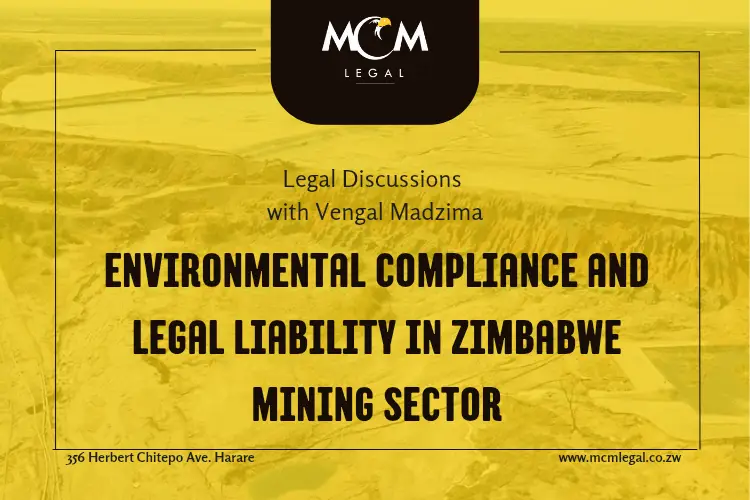NewZimbabwe.com has invited Mr. Vengai Madzima, the Senior Partner at Madzima Chidyausiku Museta Legal Practitioners (MCM Legal) to discuss with us legal issues that affect Zimbabweans. The discussions are of a general nature and those seeking specific legal advice should contact their lawyer.
Reporter: Welcome back Mr. Madzima, following recent revelations by Channel 4 news of an environmental catastrophe in Zambia, our neighbor, allegedly as a result of the spilling of a cocktail of toxic materials in the Kafue river by a Chinese company, we want to discuss our own environmental compliance in the Zimbabwe mining sector and whether enough is being done to protect us from such an occasion?
VM: Thank you.
I am aware of the alleged contamination which allegedly happened in February this year and has recently made headlines around the world. There are conflicting reports as to the extent of the contamination and counter allegations of geo–political connotations which I will not bedevil myself discussing.
What is critical from a Zimbabwe context is that the environment and its protection are an ongoing obligation and its conservation should continually be monitored and discussed as the mining sector grows because of the permanency of the effects of environmental contamination and the potential impact of certain mining methods on the way of life of our posterity.
Environmental protection is one of the areas where patriotism by either enforcers or local actors is a must. Our blessing in the extent and diversity of our mineral resources is conversely our curse in enforcement costs.
Our laws governing environmental protection in general and the mining sector in particular are well developed and comparative in the region. However, from a cost perspective, monitoring for bigger mining players in the industry is simpler and for smaller players slightly more difficult, despite the laws being in place.
Reporter: What laws are in place to protect the environment against the impact of mining?
VM: As a start, it is important to understand that environmental protection is a constitutional right. Our constitution establishes that every person has a right to ‘an environment that is not harmful to their health and well–being’. It therefore obliges our lawmakers to secure the protection of the environment.
Such laws include the Environment Management Act [Ch20:27], being the main legislation governing environmental issues, assisted by other complementary legislation like the Water Act and Forestry Act prescribing conservation laws. Further and specific to the mining industry, the current Mines and Minerals Act [Ch21:05] and the proposed Mining Bill have prescriptive provisions aimed at protecting and rehabilitating mining areas before, during and after mining.
We also have statutory instruments released from time to time to address areas that may not have been addressed by current legislation, for example, the Environmental Management (Control of Alluvial Mining) Amendment Regulations, 2024, published as Statutory Instrument 188 of 2024, banning alluvial prospecting and mining along river beds. As stated earlier, it is an ongoing engagement that requires the affected parties, responsible bodies and parliament to remain vigilant in prescribing and reacting to issues of environmental concern.
Reporter: If the laws are in place, what are the common environmental violations in Zimbabwe and their reasons?
VM: I think the question has to be addressed contextually. Zimbabwe has an abundance of various minerals over vast areas, making monitoring expensive for the responsible bodies. Further, as our mining methods are a mix of mechanised large and medium scale mining together with small scale artisanal mining, mainly by locals and in some unfortunate circumstances by foreign companies.
The application and enforcement of the laws become difficult in the absence of general community engagement and education, specifically from a constitutional right perspective. Our Environmental Management Act grants a unique right to any person or group acting in the public interest the right to approach our courts and stop or interdict an activity that is harmful to the environment, even where the person or group is not directly affected by the activity. This, in our law, is a powerful right which is not used enough.
To the first part of your question, the common violations are land degradation, deforestation, and abandonment of mining sites without rehabilitation, causing potential damage to animals and humans. This normally results from miners operating without an environmental impact assessment report (EIA), which is a prerequisite and prescribes community engagement, enabling the community to be aware of the potential mining activity and its plan for land rehabilitation.
Reporter: What liabilities are in place for companies or individuals that are caught contaminating or destroying the environment?
VM: There are administrative orders and penalties that are chargeable directly from the Environmental Management Authority (EMA) that may compel a miner to do a certain thing or cease doing a certain thing. Beyond this, a miner may suffer civil liabilities from affected parties for damage caused to the environment which may include individuals, companies and communities. In the extreme and specifically for those miners who operate without an EIA, there are criminal sanctions or liabilities.
Reporter: Thank you, Mr. Madzima we have run out of time.
VM: Thank you.
RELATED:
You can contact Vengai Madzima on vengai@mcmlegal.co.zw or at www.mcmlegal.co.zw.
